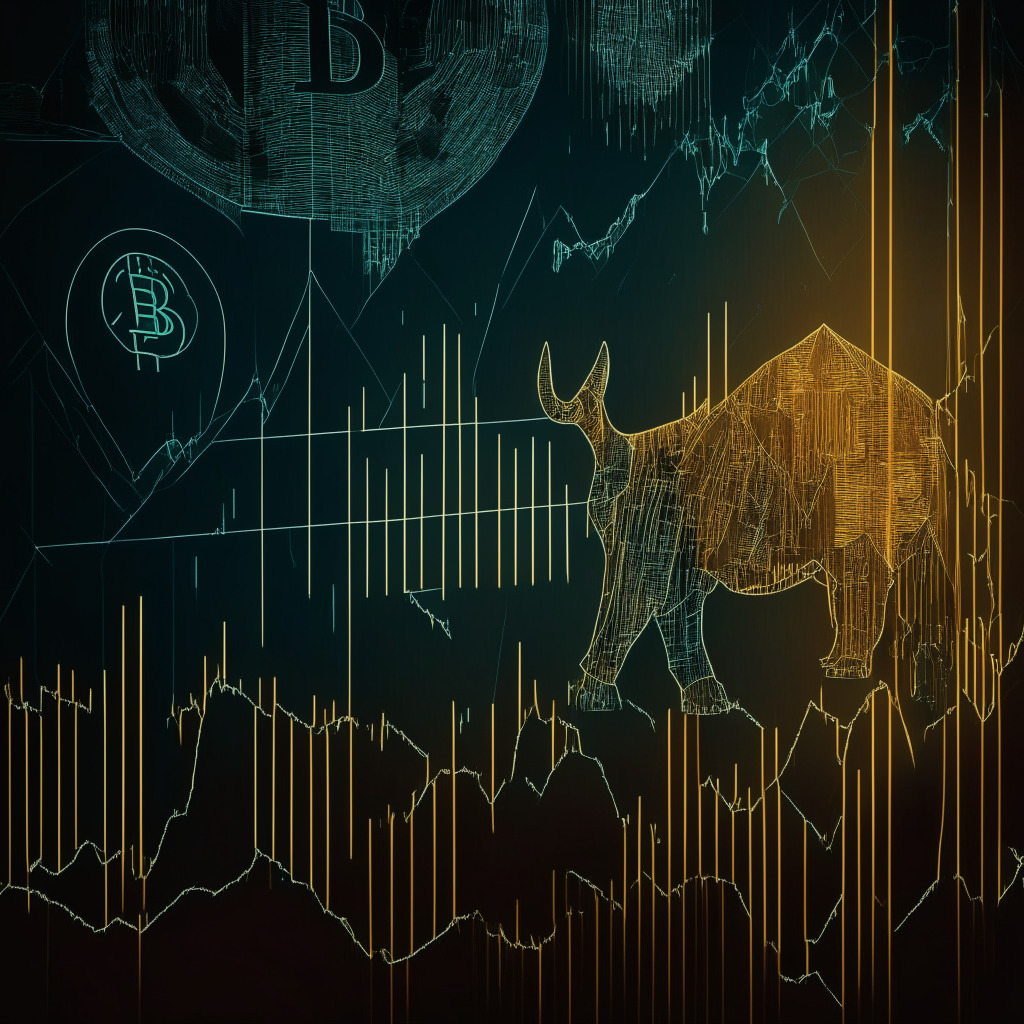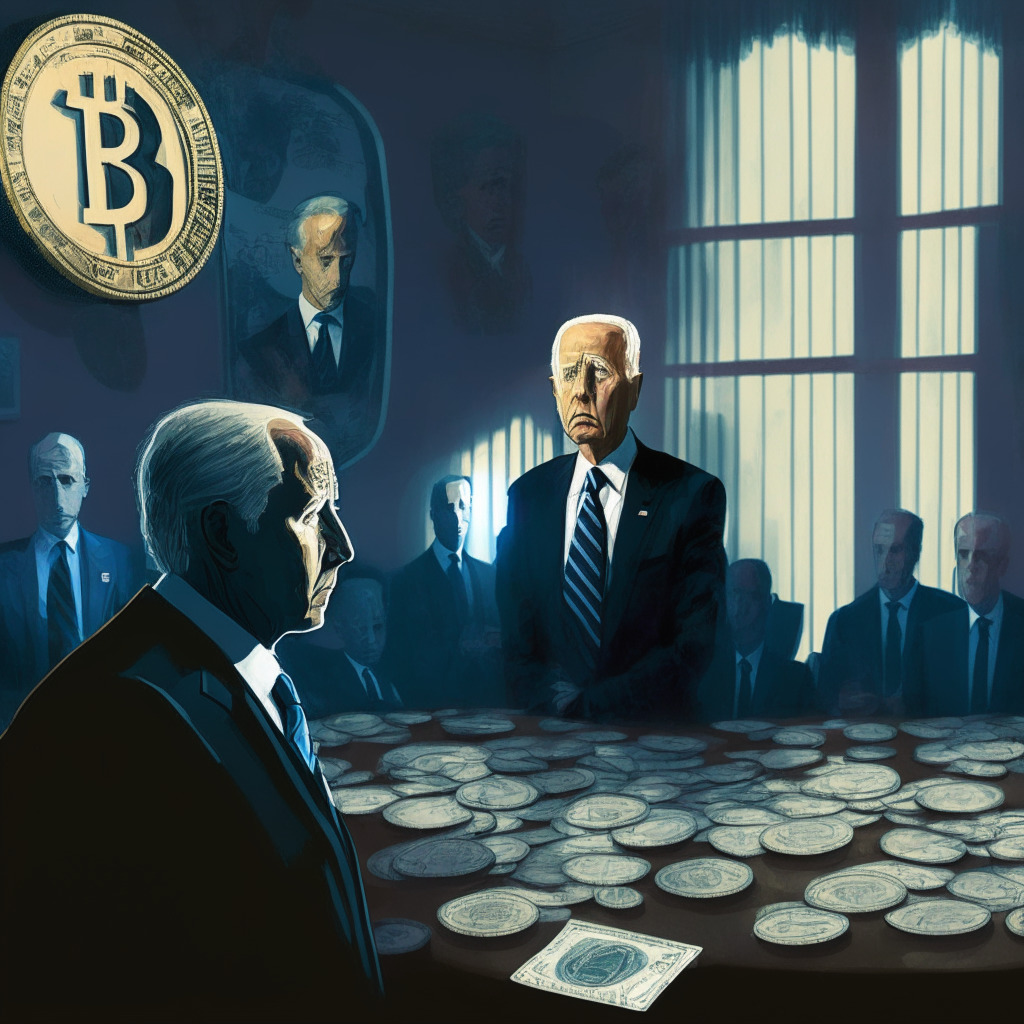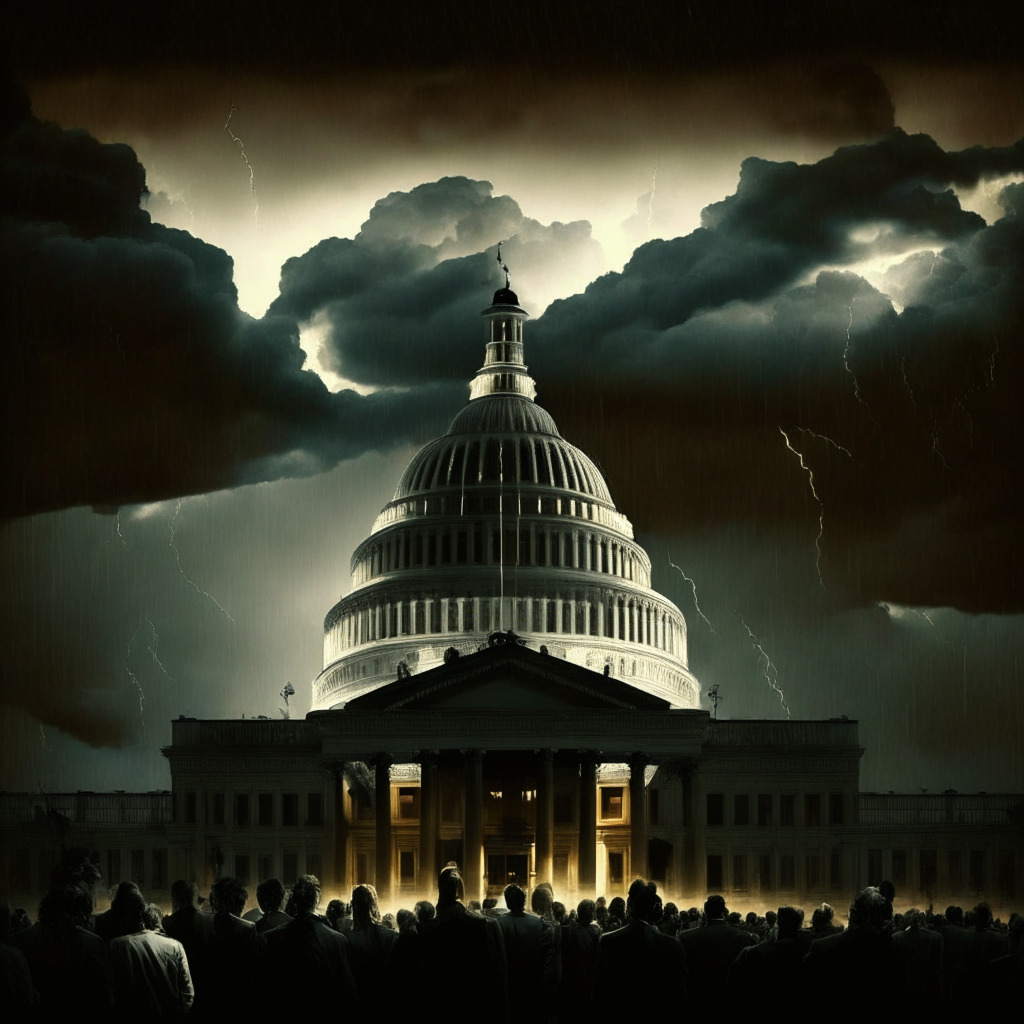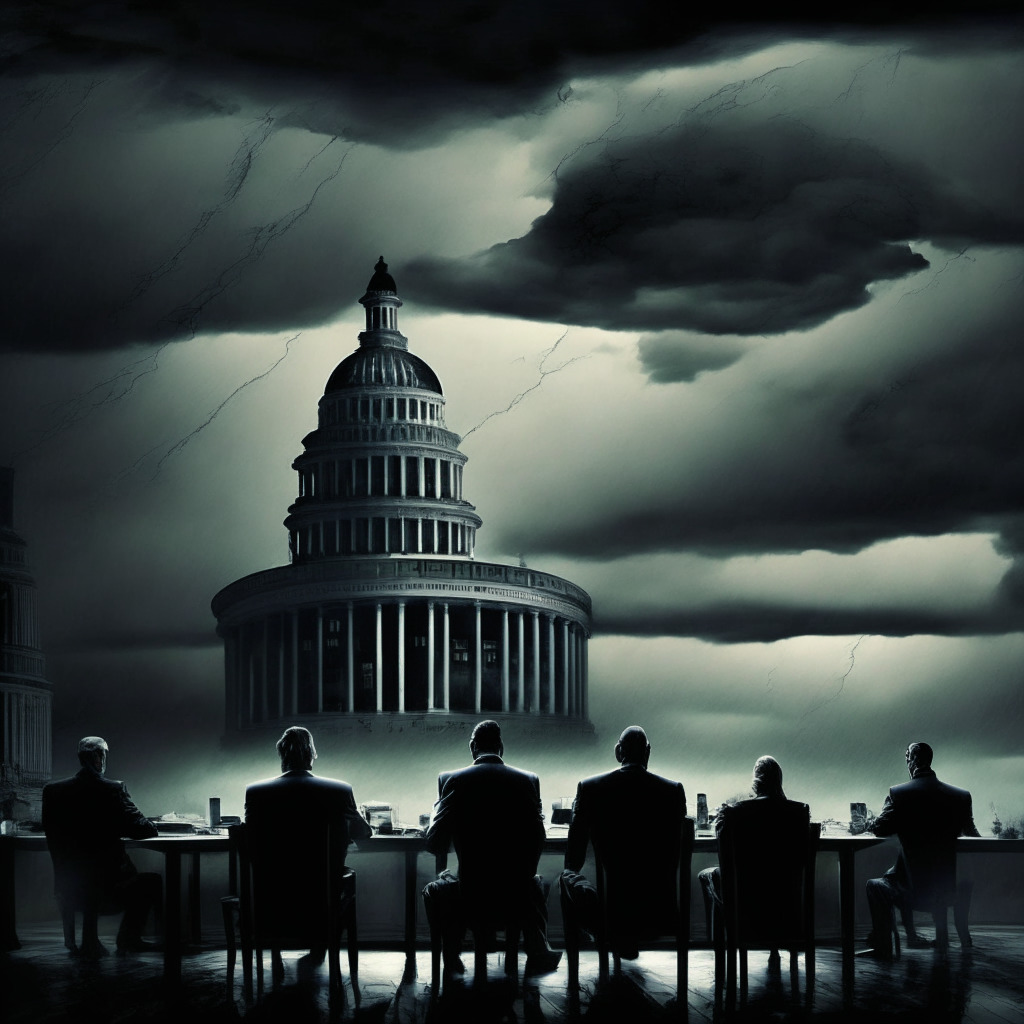Renowned trader Peter Brandt recently shared a bearish outlook on Bitcoin, pointing to a chart pattern known as a pennant or flag. Bitcoin’s ongoing consolidation and uncertainties surrounding US debt ceiling talks contribute to the overall cautious sentiment.
Search Results for: joe biden
Debt Ceiling Race Against Time: Market Crash, Crypto Volatility, and Averting Default
As the US faces a possible debt default, the Treasury Department explores options to prevent unprecedented consequences. Treasury officials are inquiring about delaying payments and using a potential surge in quarterly tax payments to extend the deadline. However, Treasury Secretary Yellen urges timely action from Congress to avoid calamity. Failure to reach a deal could trigger market crashes and recession, affecting equities and the crypto market.
Debt Ceiling Talks and Crypto: Navigating Market Uncertainty & Potential Outcomes
Amid debt ceiling deal talks, the stock market experienced a dip and fears of a market crash loom. Crypto investors and enthusiasts must remain vigilant, understanding the profound market effects of these ongoing discussions and stay informed on potential impacts.
US Debt Ceiling Dilemma: Impact on Crypto and Stock Markets, Weighing Pros and Cons
The US debt ceiling situation may significantly impact stocks and cryptocurrency markets, with potential “catastrophic” global consequences. The outcome could lead investors to sell off stocks and cryptocurrencies and purchase high-yield Treasury bills. However, Bitcoin may rally in the coming weeks amid a weakening US dollar dominance.
AI-generated Images: A New Age of Misinformation and Market Volatility?
A recent fake photo depicting an explosion at the Pentagon, created by AI, caused a brief sell-off in the US stock market and a “flash crash” in the cryptocurrency market. This incident highlights the power, potential dangers of AI-generated images, and the importance of establishing guidelines and safeguards to balance innovation and public safety.
Crypto-Friendly Presidential Candidate: Sen. Tim Scott’s Vision for US Digital Assets Future
Sen. Tim Scott announces his bid for US president with a focus on establishing a digital assets regulatory framework that safeguards consumers and encourages innovation. As the ranking member of the Senate Banking Committee, Scott aims to develop a comprehensive approach covering blockchain, digital assets, and consumer protection, emphasizing consumer safety, accessibility, and industry growth.
US Default Risk Looms: Stock Market and Crypto Impact, Market Turbulence Ahead?
The US debt ceiling deadlock poses a significant threat to financial markets worldwide; however, the stock and crypto markets remain relatively unaffected. JPMorgan warns of potential volatility surge as the default deadline approaches, which could impact the cryptocurrency market and influence Bitcoin’s support level.
Uncertainty Looms: Bitcoin, Debt Ceiling Talks, Tron Rumors, and Legal Challenges in Crypto Markets
Bitcoin faces uncertainty with its price dropping below $27,000, while Tron’s TRX gains 8% on rumors of becoming legal tender in Hong Kong. Meanwhile, the Digital Currency Group struggles to repay a $630 million debt to Gemini amidst SEC accusations, and Malaysia orders Huobi Global to halt operations for unregistered activities.
Predicting Bitcoin’s Fate Amid US Debt Ceiling Crisis: Expert Insights and Market Dynamics
Legendary trader Peter Brandt predicts potential Bitcoin price downfall amid U.S. debt ceiling dilemma and market volatility. Despite being bullish on a $40,000 target, bearish sentiment increases. Brandt, known for accurate past analyses, warns against dismissing downside risks and overconfidence in price predictions.
Debunking MetaMask Tax Collection Rumors and the Future of Crypto Taxation
ConsenSys, the company behind MetaMask, denies allegations of collecting taxes from users, clarifying that the rumor was based on inaccurate information. The misunderstanding originated from a misreading of MetaMask’s terms of service. As tax policies evolve, crypto traders should prepare for potential higher tax obligations in the future.
White House Crypto Policies Amid Debt Ceiling Crisis: Balancing Regulation & Innovation
The White House is actively addressing cryptocurrency policy amid concerns over the debt ceiling and potential economic consequences. President Biden seeks a debt deal that doesn’t protect crypto traders and wealthy tax evaders, while the US Treasury warns of potential economic danger without an agreement. Striking a balance between regulation and innovation in crypto is crucial as investors and traders closely monitor upcoming economic events and policies.
RFK Jr’s Bitcoin Stance: Protecting Privacy or Inviting Misuse and Energy Debates?
Presidential hopeful Robert F. Kennedy Jr. embraces Bitcoin, advocating for protection from invasive surveillance and governmental control at the 2023 Bitcoin Conference. He criticizes proposed energy tax on Bitcoin miners and supports decentralized systems for cryptocurrencies and democracy.
Weakening Bitcoin Bull Market: Factors Fueling Bearish Sentiment and the Road Ahead
Bitcoin’s bull market conditions seem to be weakening as investor sentiment shifts from greed to fear. Factors such as a faltering price rally, US Fed speech uncertainty, and a tight jobs market contribute to concerns. While some experts predict potential price recovery, others caution about facing significant challenges and recommend conducting thorough market research before making investment decisions.
Crypto Market Cautious Ahead of Powell Speech: Impact on Bitcoin and Investor Sentiment
As the crypto market remains cautious, Bitcoin hovers below $27,000 amidst hawkish comments from central bank officials and anticipation of Jerome Powell’s upcoming speech. The market’s risk-averse sentiment may be influenced by Powell’s possible hawkish address.
Crypto Surge Amid US Debt-Ceiling Optimism and CBDC Developments: Analyzing the Impact
Bitcoin experiences a 3% increase amid optimism surrounding a potential US debt-ceiling deal and rallying equity markets. Ripple develops a CBDC platform enabling institutions to issue digital currencies. Meanwhile, the Bitcoin Frogs NFT collection gains traction as the most traded within 24 hours.
Stable Bitcoin Amid US Debt Crisis: Tether Influence and USD’s Impact on Crypto Market
Bitcoin experiences a modest 1.5% gain as market sentiment gets a boost following President Biden’s confidence in resolving the US debt crisis. Tether’s commitment to purchasing Bitcoin may contribute to recovery, but the strengthening greenback and bearish outlook may provide hurdles.
AI vs Humanity: Balancing Benefits and Threats Amid Rapid Development
A recent Reuters/Ipsos poll shows 61% of Americans view artificial intelligence (AI) as a threat to humanity. This concern stretches across industry leaders like Elon Musk and Warren Buffett. Calls for regulation, transparency, and cooperation emerge to balance AI’s benefits and potential risks.
US Debt Default and Stablecoins: How Circle Aims to Protect USDC Reserves with Repo Agreements
Circle Internet Financial is adjusting the reserves behind the $30 billion USD Coin, considering the possibility of a U.S. government debt default. BlackRock manages the Circle Reserve Fund, now incorporating $8.7 billion in overnight repo agreements as extra protection for the USDC reserve.
Bitcoin’s Struggle: Bullish Rebound Possibilities Amid Regulatory Concerns and Market Shifts
Bitcoin recently broke past $27,200, but faces challenges as regulatory concerns and negative market sentiment persist. Despite billionaire Paul Tudor Jones expressing caution, he still believes in Bitcoin’s long-term potential. The critical support level to watch is $26,800.
Bitcoin’s Rising Status as Safe Haven Asset Amid US Debt Ceiling Crisis
A recent Bloomberg Markets Live Pulse survey suggests Bitcoin could be considered a safe haven asset, surpassing traditional options like the yen, franc, or U.S. dollar, amid concerns over the U.S. debt ceiling. The survey highlights a growing interest in digital currencies as an alternative means of asset protection, showcasing their potential in the financial future.
US Debt Ceiling Crisis: Gold, Treasury Bonds, and Bitcoin as Top Safe-Haven Assets
A recent Bloomberg survey reveals that in case of a U.S. debt default, investors would turn to gold, U.S. Treasury Bonds, and Bitcoin as top assets. This highlights shifting perceptions of cryptocurrencies as potential safe-haven assets in the broader financial landscape amidst economic uncertainty.
Cryptocurrency Integration on Twitter: Pros, Cons, and the Ongoing Global Crypto Debate
This week, Elon Musk appointed Linda Yaccarino as Twitter’s CEO, raising prospects of cryptocurrency integration into the platform. Meanwhile, regulatory clarity in the EU leads to increased investments in crypto, and Texas lawmakers support digital currencies in the Bill of Rights. However, debates on regulation and acceptance continue.
Crypto’s Hectic Week: Inflation Impact, Adoption Surge, and Regulatory Debate
This week, Tether reported $1.48 billion profit and increased crypto adoption by institutions like PayPal and Goldman Sachs. However, the Central Bank of Ireland Governor likened cryptocurrencies to a “Ponzi scheme.” US lawmakers are considering crypto regulations under SEC and CFTC supervision.
Florida’s CBDC Ban: Protecting Privacy or Stifling Innovation? The Great Divide Explained
Florida Governor Ron DeSantis recently signed a bill barring the use of centralized digital dollars, intensifying the state’s opposition to central bank digital currencies (CBDCs). The move reflects the ongoing debate between supporters of cryptocurrencies and proponents of CBDCs, with concerns about government control, privacy, and financial inclusion shaping the future of digital assets.
Stablecoin Issuers Adapt Strategies Amid US Debt Ceiling Crisis: Different Approaches Compared
Stablecoin issuer Circle has revised its reserve treasury strategy to mitigate potential risks from a US debt default, converting to short-dated U.S. Treasuries. As stakeholders in the blockchain industry adjust strategies, Circle aims to insulate itself from risks associated with a possible U.S. debt crisis.
Kraken’s Scam Baiting Strategy: A Creative Tactic to Protect Investors & Expose Fraudsters
The US crypto exchange Kraken combats online scammers through “scam baiting,” involving a fake cryptocurrency account with a sizable balance to lure and expose scammers. This innovative approach highlights the importance of robust security measures, investor fund protection, and maintaining trust in the crypto industry.
FTX Collapse: A Call for Stricter Crypto Regulation or Threat to Innovation?
The collapse of cryptocurrency exchange FTX has sparked discussions on implementing stringent regulations in the crypto market. The Financial Stability Oversight Council’s (FSOC) October report highlighted issues consistent with FTX’s problems, suggesting that proper regulations could have prevented the disaster.
MidJourney 5.1: Revolutionizing AI Art or Deepening Ethical Concerns?
MidJourney’s version 5.1 significantly improves AI-generated art, but its ease of creating deepfakes raises ethical concerns. Striking a balance between creative possibilities and potential risks is crucial as AI generators continue to evolve and improve.
Bank Failures: Unraveling the US Banking Sector and Impact on Global Economy
The recent collapse of First Republic Bank, the second-largest bank failure in US history, raises concerns about potential economic repercussions and systemic weaknesses within the US banking sector. Critics argue that the US Federal Reserve’s hawkish policies, including interest rate hikes, contributed to these failures, sparking discussions about the delicate balance governments and central banks must maintain between inflation control and a stable financial sector.
Banking Crisis Spurs Crypto and Precious Metal Growth: A Financial Turning Point?
Amidst turmoil in the banking sector, cryptocurrencies and precious metals experience growth, with Bitcoin and Ethereum increasing by 1.1% to 1.5%. As the public remains wary of traditional banking, investors seek alternative assets, raising questions about the banking industry’s future.
Impending US Debt Default: Impact, Uncertainty, and Urgent Bipartisan Efforts
U.S. Treasury Secretary Janet Yellen warns of a potential debt default by June 1, urging Congress to address the issue. A default could lead to severe economic hardships, damage global leadership, and impact national security. The May 9 bipartisan talks hold the key to understanding the urgency and potential repercussions, emphasizing the need for Congress to find a solution.































